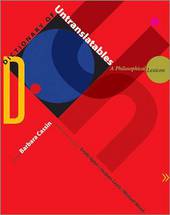
|
Dictionary of Untranslatables: A Philosophical Lexicon
Hardback
Main Details
| Title |
Dictionary of Untranslatables: A Philosophical Lexicon
|
| Authors and Contributors |
Edited by Barbara Cassin
|
|
Edited by Emily Apter
|
|
Edited by Jacques Lezra
|
|
Edited by Michael Wood
|
| Series | Translation/Transnation |
|---|
| Physical Properties |
| Format:Hardback | | Pages:1344 | | Dimensions(mm): Height 254,Width 203 |
|
| ISBN/Barcode |
9780691138701
|
| Classifications | Dewey:413.1 |
|---|
| Audience | | Undergraduate | | Postgraduate, Research & Scholarly | |
|---|
|
Publishing Details |
| Publisher |
Princeton University Press
|
| Imprint |
Princeton University Press
|
| Publication Date |
9 February 2014 |
| Publication Country |
United States
|
Description
This is an encyclopedic dictionary of close to 400 important philosophical, literary, and political terms and concepts that defy easy--or any--translation from one language and culture to another. Drawn from more than a dozen languages, terms such as Dasein (German), pravda (Russian), saudade (Portuguese), and stato (Italian) are thoroughly examined in all their cross-linguistic and cross-cultural complexities. Spanning the classical, medieval, early modern, modern, and contemporary periods, these are terms that influence thinking across the humanities. The entries, written by more than 150 distinguished scholars, describe the origins and meanings of each term, the history and context of its usage, its translations into other languages, and its use in notable texts. The dictionary also includes essays on the special characteristics of particular languages--English, French, German, Greek, Italian, Portuguese, Russian, and Spanish. Originally published in French, this one-of-a-kind reference work is now available in English for the first time, with new contributions from Judith Butler, Daniel Heller-Roazen, Ben Kafka, Kevin McLaughlin, Kenneth Reinhard, Stella Sandford, Gayatri Chakravorty Spivak, Jane Tylus, Anthony Vidler, Susan Wolfson, Robert J. C. Young, and many more.The result is an invaluable reference for students, scholars, and general readers interested in the multilingual lives of some of our most influential words and ideas. * Covers close to 400 important philosophical, literary, and political terms that defy easy translation between languages and cultures * Includes terms from more than a dozen languages * Entries written by more than 150 distinguished thinkers * Available in English for the first time, with new contributions by Judith Butler, Daniel Heller-Roazen, Ben Kafka, Kevin McLaughlin, Kenneth Reinhard, Stella Sandford, Gayatri Chakravorty Spivak, Jane Tylus, Anthony Vidler, Susan Wolfson, Robert J. C. Young, and many more * Contains extensive cross-references and bibliographies * An invaluable resource for students and scholars across the humanities
Author Biography
Barbara Cassin is director of research at the Centre National de la Recherche Scientifique in Paris. Emily Apter is professor of comparative literature and French at New York University. Jacques Lezra is professor of Spanish, Portuguese and comparative literature at NYU. Michael Wood is the Charles Barnwell Straut Class of 1923 Professor of English and Comparative Literature at Princeton University.
ReviewsPraise for the French edition: "This dictionary's great idea is to address European philosophy from the point of view of translation... [It] attains its goal by putting this principle to work: one cannot always translate a foreign concept in one word, but one can always explain it. And when one has grasped the explanation, one has acquired the concept."--Le Figaro Litt?raire Praise from the French edition: "A dictionary cannot be summarized. One great lesson, nevertheless, which can be distilled from this one (it can be gathered in the masterworks of the entries 'Traduire' ['Translate'] and 'Langues et traditions' ['Languages and traditions']), is that no language is born a philosophical one. It becomes philosophical, as it engages in exchanges with other languages. Philosophical language is impure language, and a national philosophy cannot, therefore, exist. This conviction can perhaps be one of the meanings of the unity of Europe, to which the Vocabulaire renders homage, and service."--Vincent Aubin, Le Figaro (review translated by Mark Jensen)
|